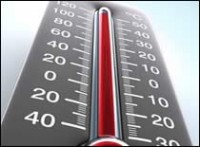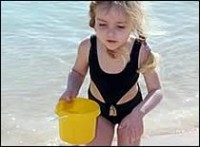 Nashville, TN — With the predicted heat index at or above 100 degrees for the remainder of the week, Tennesseans need to make wise decisions to protect themselves and their children from heat-related illnesses, especially as the 2010-2011 school year begins in some counties across the state.
Nashville, TN — With the predicted heat index at or above 100 degrees for the remainder of the week, Tennesseans need to make wise decisions to protect themselves and their children from heat-related illnesses, especially as the 2010-2011 school year begins in some counties across the state.
 “It’s important for parents and caregivers to make sure children are properly hydrated,” said Health Commissioner Susan R. Cooper, MSN, RN. “With morning temperatures above 80 degrees, kids waiting on the bus stop should have water available just like those who are participating in outdoor activities in the afternoon. Consider providing your child a water bottle to have on hand throughout the day.”
“It’s important for parents and caregivers to make sure children are properly hydrated,” said Health Commissioner Susan R. Cooper, MSN, RN. “With morning temperatures above 80 degrees, kids waiting on the bus stop should have water available just like those who are participating in outdoor activities in the afternoon. Consider providing your child a water bottle to have on hand throughout the day.”
The most life-threatening heat-related illness is heat stroke, which causes the death of approximately 400 people nationwide die each year. The condition occurs when the body is unable to regulate its temperature, which rises quickly without the ability to cool down. If emergency treatment is not provided, heat stroke can cause death or permanent disability. Symptoms include body temperature above 103 degrees Fahrenheit; red, hot and dry skin without sweating; rapid, strong pulse; throbbing headache; dizziness; nausea; confusion; and loss
of consciousness.
 “Take the necessary steps to protect and care for the young and the elderly, who are at greater risk in extreme heat. Avoid being outside during the hottest part of the day, and never leave anyone unattended in a car,” said Cooper.
“Take the necessary steps to protect and care for the young and the elderly, who are at greater risk in extreme heat. Avoid being outside during the hottest part of the day, and never leave anyone unattended in a car,” said Cooper.
Schools affiliated with Tennessee Secondary School Athletic Association must abide by its heat policy, which outlines requirements for practice and competing in high temperatures and prohibits all activities when the heat index is in excess of 104 degrees Fahrenheit. For more information, contact your child’s school or district office.
The Centers for Disease Control and Prevention offers a few simple steps to avoid these preventable illnesses.
- Drink fluids frequently. Don’t wait until you are thirsty to drink. Remember to consume non-alcoholic, low-sugar drinks in hot weather.
- Replace salt and minerals. Heavy sweating from increased temperatures can deplete your body’s salt and minerals. Non-alcoholic drinks, like sports drinks, can help you replenish these reserves.
- Wear appropriate clothing and sunscreen. Choose lightweight, light-colored, loose-fitting clothing, as well as a wide-brimmed hat and sunglasses with UV protection. Wear SPF 15 or higher sunscreen every day.
- Schedule outdoor activities carefully. Try to limit outdoor activity to morning and evening hours with rest breaks in shady areas, if available.
- Pace yourself. If you are unaccustomed to working or exercising in a hot environment, start slowly and increase effort gradually. If your heart is pounding or you are gasping for breath, stop the activity and rest in a cool, shady area.
- Stay cool indoors. If your home does not have air conditioning, go to the mall or library to cool off. Cool showers or baths, as well as keeping your stove and oven off, are other ways to cool down inside.
- Use the buddy system. Partner with a friend and watch for signs of heat-related illness in each other. Senior citizens are more susceptible, so if you are over 65, ask a friend to check on you over the phone twice a day. If you know someone in this age group, remember to check on them at least twice a day.
- Monitor those at high risk. Infants and children under 4 years of age, people over 65, people who are overweight, those who overexert thems elves during work or exercise and people who are physically ill (especially those who have heart disease or high blood pressure, take certain medication, or suffer from insomnia, depression or poor circulation) are especially at risk.
- Call for immediate medical assistance if you believe you or another person is experiencing heat stroke. While waiting on emergency assistance, get the victim to a shady area, cool them rapidly using cool water and monitor body temperature until it reaches 101 to 102 degrees Fahrenheit, and do not give the victim any fluids to drink.
For more information about heat-related illnesses, including prevention and treatment tips, visit the CDC’s website at http://www.bt.cdc.gov/disasters/extremeheat/heat_guide.asp.


